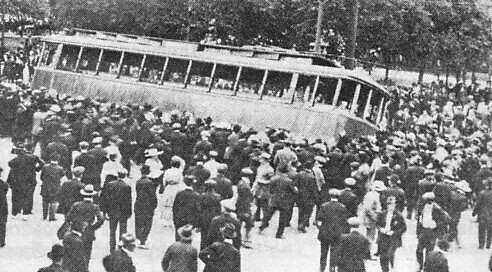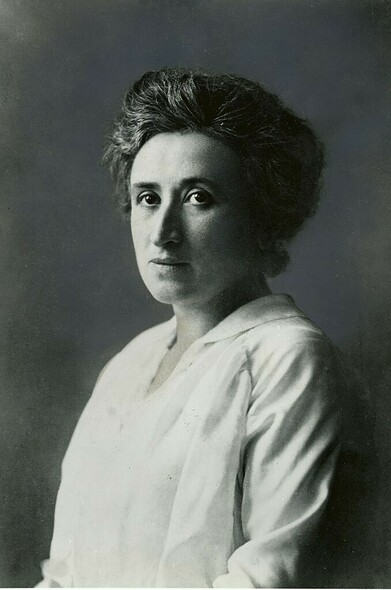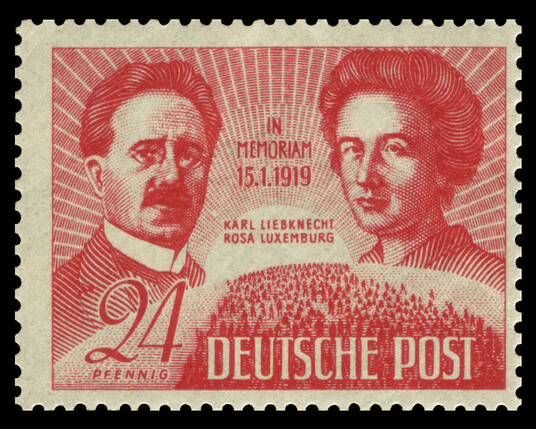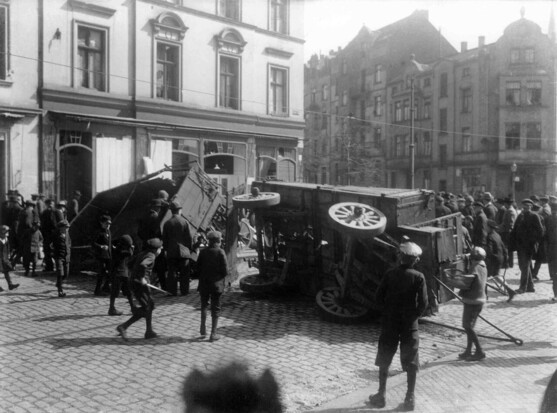MikeDunnAuthor · @MikeDunnAuthor
1432 followers · 3146 posts · Server kolektiva.socialToday in Labor History June 28, 1916: 50,000 workers staged a one-day protest strike against the trial of Karl Liebknecht for his anti-war protests. He was a Left Communist and member of Parliament, one of the very few to denounce the Armenian Genocide by the Ottomans. He later formed Spartacist League, with Rosa Luxemburg, and together they helped lead the 1918 Communist revolution. The Prussian army assassinated them, making them martyrs for the socialist cause throughout Europe.
#WorkingClass #LaborHistory #communism #KarlLiebknecht #Revolution #ArmenianGenocide #Spartacist #RosaLuxemburg #socialism
#workingclass #LaborHistory #communism #karlliebknecht #Revolution #armeniangenocide #spartacist #rosaluxemburg #socialism
MikeDunnAuthor · @MikeDunnAuthor
882 followers · 1555 posts · Server kolektiva.socialToday in Labor History March 6, 1925: Miners in Cape Breton, Canada, struck against the British Empire Steel Corporation (BESCO). They’d been striking against BESCO regularly for the past 5 years over wage cuts. The 1925 strike lasted 5 months. Company police killed one miner, William Davis. BESCO eventually went bankrupt. These strikes were part of the Canadian Labour Revolt (1918-1925) led by the One Big Union. The Vancouver General Strike (1918) and the Winnipeg General Strike (1919) inspired the OBU and subsequent strikes of the Labor Revolt. The OBU was also influenced by the IWW, the Spartacist Uprising in Germany and the Communist Revolution in Russia. The OBU was a syndicalist labor union that sought to overthrow capitalism and replace it with a socialist system based on worker control of the workplace.
#WorkingClass #LaborHistory #CapeBreton #steel #strike #GeneralStrike #winnipeg #vancouver #spartacist #IWW #communism #OneBigUnion #socialism #syndicalism
#workingclass #LaborHistory #capebreton #steel #strike #generalstrike #winnipeg #vancouver #spartacist #IWW #communism #onebigunion #socialism #Syndicalism
MikeDunnAuthor · @MikeDunnAuthor
870 followers · 1533 posts · Server kolektiva.socialToday in Labor History March 5, 1871: Rosa Luxemburg (1871-1919) was born in Zamosc, Poland. Together with Karl Liebknecht, she helped found the radical Spartacus League in 1916. The Spartacists and other leftwing Council Communists launched an uprising to replace the Social Democratic government with a communist one. Many of the workers obtained arms. They tried, but failed, to get the support of the Navy, which remained neutral in the conflict. However, the Social Democrats got the anti-Communist Freikorps paramilitary to fight for their side. Many of the ultranationalist Freikorps members were suffering from PTSD from WWI. Many went onto to become members of the Nazi Party and served in the SS. The Freikorps had weapons and military equipment leftover from WWI and were able to quash the uprising within a week. Up to 200 people died in the fighting, including 17 Freikorps soldiers. The Social Democrats captured, beat and executed Liebknecht and Luxemburg.
#WorkingClass #LaborHistory #RosaLuxemburg #spartacist #communist #nazis #uprising #ptsd #execution
#workingclass #LaborHistory #rosaluxemburg #spartacist #communist #nazis #uprising #ptsd #execution
MikeDunnAuthor · @MikeDunnAuthor
592 followers · 899 posts · Server kolektiva.socialToday in Labor History January 15, 1919: Rosa Luxemburg and Karl Liebknecht, founders of the Spartacist League and the German Communist Party, were murdered. On January 7, the Spartacists called a General Strike to overthrow the moderate Social Democratic government. 500,000 workers participated. To quash the rebellion, the Social Democrats utilized the Freikorps, a right-wing paramilitary composed of World War I veterans, many of whom were suffering from PTSD, and many of whom went on to become Nazis, including Heinrich Himmler. The Freikorps slaughtered 200 people during the week-long uprising. Demonstrations and further unrest broke out in response to the assassinations of Luxemburg and Liebknecht. The Freikorps quashed these, too, as well as the soviets that had been implemented in Bavaria and other parts of Germany. In all, they slaughtered over 5,000 people.
#workingclass #LaborHistory #rosaluxemburg #karlliebknecht #communist #spartacist #generalstrike #uprising #nazis #rebellion #soviet
#workingclass #LaborHistory #rosaluxemburg #karlliebknecht #communist #spartacist #generalstrike #uprising #nazis #rebellion #soviet
MikeDunnAuthor · @MikeDunnAuthor
533 followers · 766 posts · Server kolektiva.socialToday in Labor History January 5, 1919: Karl Liebknecht and Rosa Luxemburg launched the Spartacist Uprising in Berlin. Part of the post-WWI Revolution occurring throughout Germany, the Spartacist uprising was essentially a power struggle between the Spartacists and other Council Communists (left-wing, anti-authoritarian communists) against the Social Democrats. 500,000 workers participated in the General Strike they called for January 7 to replace the moderate Social Democratic government with a communist one. Many of the workers obtained arms. They tried, but failed, to get the support of the Navy, which remained neutral in the conflict. However, the Social Democrats got the anti-Communist Freikorps paramilitary to fight for their side. The Freikorps had weapons and military equipment leftover from WWI and were able to quash the uprising within a week. The Freikorps was comprised of WWI vets, many of whom were suffering from PTSD. Many went on to became Nazis. Up to 200 people died in the fighting, including 17 Freikorps soldiers. The Social Democrats captured, beat and executed Liebknecht and Luxemburg.
#workingclass #LaborHistory #spartacist #uprising #germany #communism #nazis #fascism #rosaluxemburg #revolution #wwi #generalstrike
#workingclass #LaborHistory #spartacist #uprising #germany #communism #nazis #fascism #rosaluxemburg #Revolution #wwi #generalstrike



